lesson38新概念第二册第38课ppt
新概念英语第二册Lesson38everythignexcepttheweather课件

Exercise
三、单项选择
1.I can do anything to help you C lend you money.
A. but
B. and
C. except
D. excepts
2.We dreamed of B to the space by spaceship.
A. traveled
hardly…when…
几乎来不及……就……
Article focuses
Everything except the weather. 1. except, but 与besides的区别:
except=but : not including, 除…之外,不包括它们的宾语 besides: in addition to , as well as 除…之外还有,包括它的宾语
Exercise
二、用括号中的词连接以下各组句子 1.She speaks to me. She knew me well.(as if)
_S_h_e_s_p_e_a_k_s_t_o_m_e__as__if_s_h_e_k_n_e_w__m_e_w_e_l_l.___________________ 2.You are ready. We’ll set out.(as long as)
(When someone…just) _W__h_e_n_s_o_m_e_o_ne__k_no_c_k_e_d_a_t_t_h_e_d_o_o_r_,_I_w_a_s_j_u_st__tu_r_n_in_g_o_n__th_e__T_V_. 5.I like living in the countryside. It is far from the city.(even though) _I__li_ke__li_vi_n_g_in__t_h_e_c_o_un_t_r_y_si_d_e_e_v_e_n_t_h_ou_g_h__it_i_s_f_a_r _f_ro_m__t_h_e_c_it_y_. 6.The robber ran out of the bank. He was arrested by police. (no sooner…than) __T_h_e _r_ob_b_e_r_h_a_d__no__s_oo_n_e_r_r_a_n_o_u_t_o_f_t_h_e_b_a_n_k_t_h_a_n_h_e_w_a_s_a_r_r_ested __by__p_ol_ic_e_.__
最新新概念英语第二册-38课课件ppt

• You mustn’t watch TV for such a long time continuously.
• This plane can fly continuously for twenty hours. • continually adv. 频繁地,反复地(指动作中间有间
• 后面的从句用一般过去时 • had no sooner done…than +一般过去时, 固定
用法 (时态结构: 完成时态+ than + 一般过去 时)
• He had no sooner arrived than he called me up.
• no sooner 放在句首就要倒装
• No sooner had he arrived than he called me up. (倒装)
If you have ever been to England ,you must be impressed by the beautiful scenery.However,everyhing there is perfect except the weather.
• ★complain v. 抱怨 • complain to sb. 向某人抱怨 • complain of/about sth. 抱怨某事
• immediately
• 1.adv • He lay down and was asleep immediately. • All those who are immediately involved
will be informed of the decision.
lesson新概念第二册第38课ppt课件
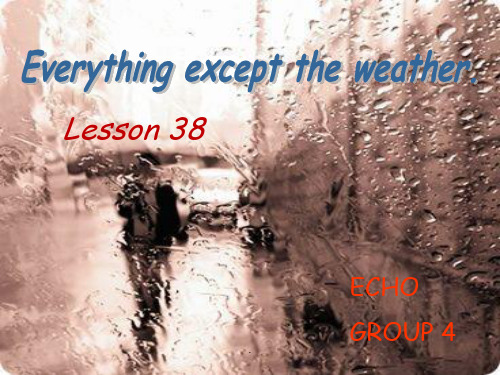
2. We come to school everyday, but not Monday.
We come to school everyday except Monday.
• ★complain v. |kəm'plein|
England and had planned to settle down
in the country.
dream of doing sth
I have always dreamed of winning the lottery.
1. 水不停从桥下流过。
The river flows under the bridge continuously.
• ★continually • |kən'tɪnjuəli|
adv. (frequently)
1. 小孩时不时地会哭。
The baby cries continually.
2. 天频繁地下雨。
• My old friend, Harrison, had lived in the
Mediterranean for many years before he returned to England.
Had+ v.p.p
past perfect tense
Sb. had done sth before sb did sth
• ★sunshine
• ★except prep. (apart from) |ik‘sept|
•Everyone is here except Lily. (Lily is not here.) 1. She likes all the books, but she does not like that blue one.
新概念第二册38优秀课件
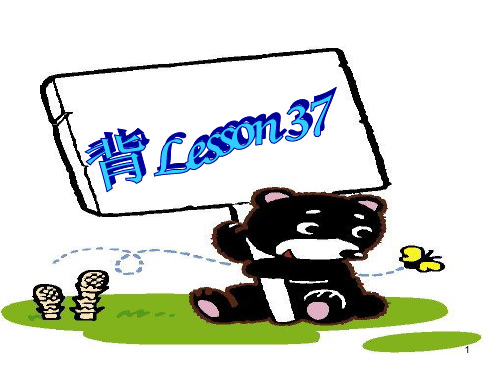
将来完成时 will have done...
将来进行时除了表示最近或不久的将来正在进行的动作外, 还可以表示计划或安排好的事:
A great many people will be visiting the country. 将来完成时用于表示到将来某一时刻已经完成的动作。将来
完成时由will have+过去分词构成。它常与by和 not…till/until+表示时间的名词连用。 I hope they’ll have finished it in time for the journey. I expect you will have changed your mind by tomorrow. I will have finished it until/till tomorrow.
Page 4
根据所给的汉语意思写出单词,并用其正确形式填空。
1. He ____(抱怨)to me about the food yesterday. 2. That boy is crying ____(不断地). 3. She sat in the garden enjoying the ____(阳光). 4. We go there every day ____(除了)Sunday. 5. It is ___(刺骨地)cold today. 6. She ____(做梦)that she could fly last night. 7. My father will ____(退休)next year. 8. My legs were so weak that I could ____(几乎不)stand.
Kunming
15
How is the weather in London? Where is London?
第38课新概念英语第二册lesson 38 精编课件

She had finished writing the composition by 10 :00 this morning.
判断依据
1. 由时间状语来判定 ( 1 ) by + 过去的时间点。 如: I had finished reading the novel by nine o'clock last night. ( 2 ) by the end of + 过去的时间点。 如: We had learned over two thousand English words by the end of last term. ( 3 ) before + 过去的时间点。 如: They had planted six hundred trees before last Wednesday.
生活在热带地区的人,那里的人性情易暴躁和发怒。 居住在寒冷地带的人,具有较强的耐心和忍耐力的性
格。比如生活在北极圈内的因纽特人,被人们称为世界 上“永不发怒的人”。
居住在温暖宜人水乡的人们,因为气候湿润,风景秀 丽,人们对周围事物敏感,且多情善感,机智敏捷。
山区居民,因为山高地广,人烟稀少,开门见山,长
I have time enough to have coffee. 我 有足够的时间喝咖啡
1.Is it sunny and hot in summer in England, just like Tianjin?
2. Why did Harrison sell his house so quickly?
过去完成时
概念:过去完成时表示在过去某一时间或动作之 前已经发生或完成了的动作,即“过去的过去”。
----|---------- |--------------|--->
新概念二 第38课课件

5.sunshine n. 阳光
a drop of sunshine 一缕阳光 She's always like a drop of sunshine.她经常像阳光一样。 sunlight sunlight 日光;阳光,指的是:白天来自太阳的光。 sunshine 阳光;日光,指的是:来自太阳的光和热。
1.except prep. 除了,除了...外。
Except a broken chair, the room has no furniture. 除了一把破椅子,这间房子里什么也没有。(chair与furniture性质相同) except for 除.. 之外 Except for a broken chair, the room is empty. 除了一把破椅子外,这间房子是空的。 (except for没有“所指项目类别”的限制) except that I know nothing about his career except that he is a graduate of Oxford University. 我对他的职业一无所知,只知道他毕业于牛津大学。 except表示“除.....外,(其余都)……”指同一类事物的总体中除去一部分。
课文注释
1.He had often dreamed of retirina in Enaland and had planned to settle dowr in the country.过去他常幻想退休后到英国,并计划在乡间安顿下来。
(1)dream of在这里不表示具体的做梦,而是“幻想”、“向往”的意思: Frank used to dream of having a car of his own. 弗兰克过去常幻想拥有一辆自己的车。 (2)settle down 是个固定短语,可以表示“定居”、“安身”、“安顿”等含义: They settled down in Australia in 1988. 他们1988年在澳大利亚定居了。 After two years of travelling,I want to settle down now. 旅行了两年之后,我现在想过安定的日子了。
英语新概念第二册第三十八课
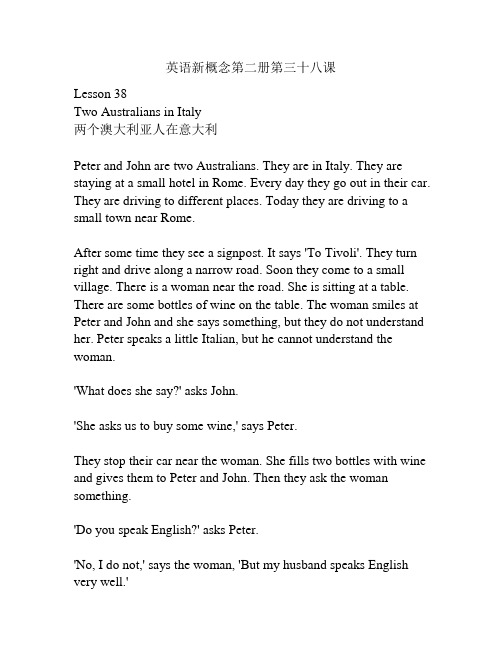
英语新概念第二册第三十八课Lesson 38Two Australians in Italy两个澳大利亚人在意大利Peter and John are two Australians. They are in Italy. They are staying at a small hotel in Rome. Every day they go out in their car. They are driving to different places. Today they are driving to a small town near Rome.After some time they see a signpost. It says 'To Tivoli'. They turn right and drive along a narrow road. Soon they come to a small village. There is a woman near the road. She is sitting at a table. There are some bottles of wine on the table. The woman smiles at Peter and John and she says something, but they do not understand her. Peter speaks a little Italian, but he cannot understand the woman.'What does she say?' asks John.'She asks us to buy some wine,' says Peter.They stop their car near the woman. She fills two bottles with wine and gives them to Peter and John. Then they ask the woman something.'Do you speak English?' asks Peter.'No, I do not,' says the woman, 'But my husband speaks English very well.''Where is he?' asks John.'Oh, he is in America. He is learning to speak English,' says the woman.Peter and John say 'Goodbye' to the woman and they drive on. 'Her husband is in America,' says John. 'And she sells wine!' 'Do you understand it?' asks Peter.'Yes, I do,' says John. 'I understand her husband.'。
新概念二Lesson 38课件

Listening & comprehension
1.Why did Harrison sell his house so quickly? 2.Did Harrison think of everything?
Lead-in
• 据说平均每个英国人一生中要花6个月的时间谈论 天气问题。 • 一旦碰上好天气,谈话的开场白就固定成了 “It’s a nice day today, isn’t it?”让人不禁想 起一个经典的笑话——一天下午,英国作家萧伯 纳在街上散步,迎面走来一位老先生,开口就是: “下午好!天气很好不是么?”萧伯纳幽默地回 答:“是啊,但是在过去的两个小时里,已经有 20个人告诉过我了,谢谢你。”
Lesson 38 Everything except the weather
Warm up-English jokes
Persistance 缠住不放
• Returning from a golf outing(远足,短途旅行) , my husband was greeted at the door by Sara, our four-year-old daughter. Daddy, who won the golf game? You or Uncle Richie?Uncle Richie and I don't play golf to win, my husband hedged (避免作正面答复) . We just play to have fun.Undaunted, Sare said, Okay, Daddy, who had more fun?
• • • • • • • • • • •
• • •
6、In the end, it was more than he could bear. more than在这里表示“超过……的范围” This piece of news is more than I can believe. It was more than I could understand. I can't affard it. = It was more than I can affard. 这种用法与它通常表示“比……更多”的用法稍有不同: There were more than ten people in the room. 7、He had hardly had time to settle down when he sold the house and left the country. hardly…when… 还没来得及……就……,用法同no sooner…than hardly had sb. done when… (hardly在句首, 要倒装) He had hardly opened his eyes when he was knocked out.(knock out : 打晕, 击倒) have time to do sth. 有时间做某事 I have no time to talk with you. 我没时间和你说话 I have enough time to have coffee.
新概念第二 册38课时

Harbin
Beijing
Latitude(纬度)
Shanghai Hangzhou
Kunming
How is the weather in London? Where is London?
Let’s talk!
How is the weather in England?
The Northern Hemisphere
Warming – up: How is the weather
How is the weather in Hangzhou today?
Moscow
Beijing
Shanghai
Toronto Boston
DIFFERENTt causes the different weather in different places?
frost(霜). The two worst months in England are
January and February. They have many cold wet days one after another.
英国属海洋性气候,具有冬暖夏凉的特点,冬夏 没有很大差别,这主要是因为它是一个岛屿国 家。(冬天,海洋比陆地温度高,海风将热量带到 陆地,导致陆地温度升高,夏天则相反).西风 常常吹过英国大陆,致使常年有雨.
England USA
China
Australia The Southern Hemisphere
What is the weather like in England?
In spring: Mild(温和的), dry and sunny. Rainy,
cloudy and warm. In summer: Dry, cloudy and cool. Rain and showers. In autumn: Dry, sunny. Fog early and late. In winter: Strong winds, heavy rain. Snow, cold. The best seasons are spring and summer. The nearer
新概念英语第二册Lesson 38(共53张PPT)
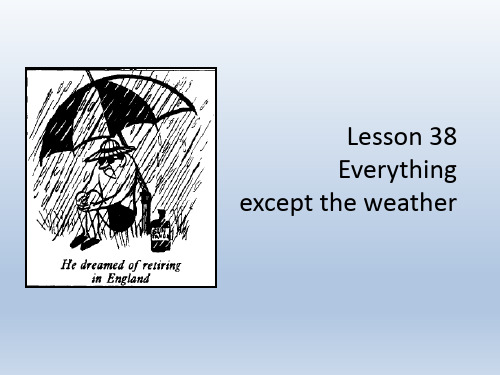
Text
The dream he had had for so many years ended there.
Comprehension questions
• Why didn't he like the weather? • It rained continually and it was often bitterly
cold.
Comprehension questions
• Did he get a shock? • Yes, he did.
Text
1 The sea moves (continuously) (continually). 2 He borrows money from people (continuously) (continually)
Text
• After so many years of sunshine, Harrison got a shock.
before.
WORDS
New words and expressions
New words and expressions
New words and expressions
except prep.
• used to introduce the only person, thing, action, fact, or situation about which a statement is not true
• Had he often dreamed of retiring in England? • Yes, he had.
Comprehension questions
• Where had he planned to settle down? • In the country.
新概念英语第二册课件Lesson38(共36页)
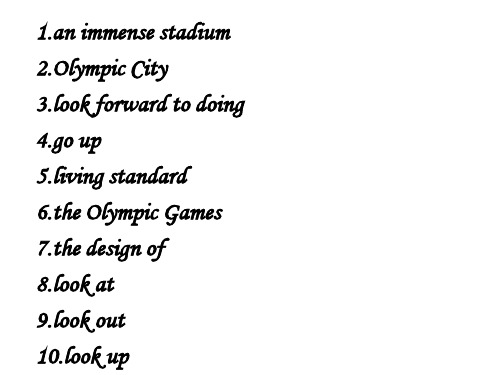
1.They will hold the Olympic Games next year.
2.I will pay for the car in 3 months’ time.
3.They will finish the bridge next year.(by the end of next year.)
• After we _______h_a_d_h_a_d_o_u_r_t_es_t_s _____, we ______ha_d__a_lo_n_g_h_o_li_d_a_y___________
15.He showed us a picture. Then he showed us around the house. 用过去完成时连接两句)
13.Jim’s father mended the car. It was broken. (用过去 完成时连接两句) The car had been broken before Jim's father mended it.
14.We had our tests. Then we had a long holiday.( 用过去 完成时连接两句)
6. no sooner …than (更正式) as soon as 一…就…
常与过去完成时,一般过去时连用
Eg:I had no sooner taken my seat than he began to complain.
7. as if=as though ①陈述式:as if/as though 后面的句子
文中 ‘as if he had never lived in England before’ 用的就是虚拟的表达,用了 ‘have never lived’的过去式 ‘had never lived’,说明Harrison 以前是住在英国。
新概念第二册第三十八课

except, except for与apart from 三者都表示“除……以外”,有时可以互 相代替使用: Everyone has helped in some way apart from/ except for/except you. 每个人都帮了点忙,只有你没有。 I have no other books apart from/ except for/except these. 除了这些书以外我再没有其他书了。
Lesson 38 Everything except the weather
What’s the weather like in
?
It’s
in
.
warm
spring summer
hot
cold
cool
autumn winter
wind rain
[ei]
windy rainy
[i]
[i]
有风的,多风的 下雨的;多雨的
except [ik'sept] 除…外 expect [iks'pekt] 期待 1.___being a little large the hat looks nice. 2. He gets up early every day_ __Sunday. 3. We need fifteen more people ______our team to do the job.
[i]
sun
[ ]
sunny
cloudy snowy wet
[e]
潮湿的
晴朗的,暖和的
cloud
[au]
多云的,阴天的
snow [әu] dry
[ ai ]
(完整版)新概念英语第二册第38课
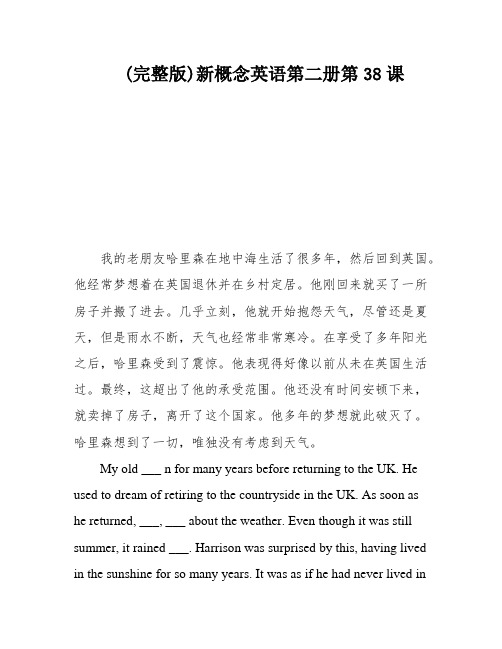
(完整版)新概念英语第二册第38课我的老朋友哈里森在地中海生活了很多年,然后回到英国。
他经常梦想着在英国退休并在乡村定居。
他刚回来就买了一所房子并搬了进去。
几乎立刻,他就开始抱怨天气,尽管还是夏天,但是雨水不断,天气也经常非常寒冷。
在享受了多年阳光之后,哈里森受到了震惊。
他表现得好像以前从未在英国生活过。
最终,这超出了他的承受范围。
他还没有时间安顿下来,就卖掉了房子,离开了这个国家。
他多年的梦想就此破灭了。
哈里森想到了一切,唯独没有考虑到天气。
My old ___ n for many years before returning to the UK. He used to dream of retiring to the countryside in the UK. As soon as he returned, ___, ___ about the weather. Even though it was still summer, it rained ___. Harrison was surprised by this, having lived in the sunshine for so many years. It was as if he had never lived inthe UK before. In the end, he couldn't take it anymore and sold the house before even settling down, leaving the country. His dream for many years was ___.Regardless of the complaints, ___, ___ work, and ___ surroundings, and continue to live their lives in this unique and diverse n.___After taking a break, the n resumed.How can you continue working with so much noise?The weather remained cold.There ___There was a continuous line of cars on the road.___ undrinkable.___ past.___.___.1) 阳光[U]。
新概念英语二lesson 38课(共39张PPT)

瑞雪兆丰年
Complain 抱怨
★complain v. 抱怨
• complain to sb. 向某人抱怨 • complain of/about sth. 抱怨某事 • • • • 我们没有什么可发牢骚的 We have nothing to complain of. 不要向我抱怨了! Don't complain to me !
★continuously adv. 不断地,连续地 (指动作中间没有间断) • 你不许连续看很长时间的电视。 • You mustn’t watch TV for such a long time continuously. • 这架飞机可以连续飞行20小时。 • This plane can fly continuously for twenty hours. • • • • • • continually adv. 频繁地,反复地 (指动作中间有间断但又持续很久) 天频繁地下雨。 It rained continually. 小婴儿不停地哭。 The baby cries continually.
• L38 Everything except the weather
新概念二第38课PPT NCE2 Lesson38

• Except for an old lady, the bus was empty. 除了有一个老太太以外, 这辆公 共汽车是空的。
• apart from 表示“除 …之外”。 • 根据上、下文的不同,它既可用作 besides, 也可用作 except 和 except for。 • Apart from them, I had no one to talk to. (= except) • Apart from other considerations, time is also a factor. (=besides ) • (It is) Good work apart from a few slight faults. (= except for)
• 温带海洋性气候
位于大陆西岸,南、北纬40°~60°地区。终年处在西风带,深受海洋气团影响,沿岸又有暖流经过, 冬无严寒,夏无酷暑,最冷月平均气温在0℃以上,最热月在22℃以下,气温年、日较差都小。全年都有 降水,秋冬较多,年降水量在1,000 毫米以上,在山地迎风坡可达2,000~3,000 毫米以上。这种 气候在西欧最为典型,分布面积最大,在南、北美大陆西岸相应的纬度地带以及大洋洲的塔斯马尼亚岛和 新西兰等地也有分布。
★plan: plan to do sth.计划/打算做某事 当plan,think,expect,hope intend 用于过去完成时表示“原来/本来/打算/希望做某事” We had hoped that they would be able to visit us.
3、He had no sooner returned than he bought a house and went to live there. • no sooner…than… 一……就……(关联词,引导时间状语从句,
- 1、下载文档前请自行甄别文档内容的完整性,平台不提供额外的编辑、内容补充、找答案等附加服务。
- 2、"仅部分预览"的文档,不可在线预览部分如存在完整性等问题,可反馈申请退款(可完整预览的文档不适用该条件!)。
- 3、如文档侵犯您的权益,请联系客服反馈,我们会尽快为您处理(人工客服工作时间:9:00-18:30)。
The river flows under the bridge continuously.
• ★continually • |kən'tɪnjuəli|
adv. (frequently)
1. 小孩时不时地会哭。
The baby cries continually.
2. 天频繁地下雨。
1. I couldn't understand it. •It was more than I could understand.
2. I can't afford it.
It was more than I can afford.
• He had hardly had time to settle down
complain about
Students sometimes complain about the heavy homework.
even though=even if/though/although
Even though he apologized, I won’t forgive him.
• After so many years of sunshine, Harrison got a shock.
★ Think before you leap.
• My old friend, Harrison, had lived in the Mediterranean for many years before he returned to England. He had often dreamed of retiring in England and had planned to settle down in the country. He had no sooner returned than he bought a house and went to live there. Almost immediately he began to complain about the weather, for even though it was still summer, it rained continually and it was often bitterly cold. After so many years of sunshine, Harrison got a shock. He acted as if he had never lived in England before. In the end, it was more than he could bear. He hadhardly had time to settle down when he sold the house and left the country. The dream he had had for so many years ended there. Harrison had thought of everything except the weather.
1.他总是向我抱怨他的邻居。
He always complains to me about his neighbor.
2. 妻子总是为了钱向他抱怨。
His wife always complains to him about money.
• ★ continuously adv. (it doesn’t stop at all) |kən'tɪnjuəsli|
• Country (国家, 乡间) and Countryside (农 村).
• He had planned to settle down in the country. (1.3)
• He sold the house and left the country. (1.9)
• The countryside around England is very beautiful. 英国周围的乡村非常漂亮.
• ★sunshine
ห้องสมุดไป่ตู้
• ★except prep. (apart from) |ik‘sept|
•Everyone is here except Lily. (Lily is not here.) 1. She likes all the books, but she does not like that blue one.
• My old friend, Harrison, had lived in the
Mediterranean for many years before he returned to England.
Had+ v.p.p
past perfect tense
Sb. had done sth before sb did sth
when he sold the house and left the country. • hardly...when... (还没来得及...就...) • sb. had hardly done sth. than sb. did sth.
1. He had arrived at home. It began to rain.
Fill in the blanks.
• 1. He ____(抱怨)to me about the food yesterday. • 2. That boy is crying ____(不断地). • 3. She sat in the garden enjoying the ____(阳光). • 4. We go there every day ____(除了)Sunday. • 5. It is ___(刺骨地)cold today. • 6. She ____(做梦)that she could fly last night.
as if= as though (subjunctive虚拟语气)
She acted as if she had never seen me before.
He looked at me as if I were crazy.
• In the end, it was more than he could bear.
He had hardly arrived at home when it began to rain.
2. The boy had opened his eyes. He fell down.
The boy had hardly opened his eyes when he fell down.
It rains continually.
• ★bitterly (extremely and sharply)
|'bitəli|
It’s bitterly cold. I am bitterly disappointed.
• ★•MtehediMteerdraitneeraranneann. =the Mediterranean sea |meditə'reiniən|
I was surprised, because she appeared suddenly in front of me.
I got a shock, because she appeared in front of me suddenly.
• He acted as if he had never lived in England before.
• He had no sooner returned than he
bought a fine house and went to live there.
no sooner...than : as soon as/on doing (一…就…) sb. had no sooner done sth. than sb. did sth.
e.g. The boy had finished breakfast. The boy went to school.
The boy had finished breakfast before he went to school.
• He had often dreamed of retiring in
• The dream he had had for so many
years ended there.
The dream ended.
• Harrison had thought of everything
except the weather.
•think of :think about
I always think about you.
• Almost immediately he began to complain about the weather, for even though it was still summer, it rained continually and it was often bitterly cold.
Lesson 38
ECHO GROUP 4
New words and
expressions
• sunshine • except • complain • continuously • continually • bitterly • Mediterranean
n. 阳光 prep. 除了 v. 抱怨 adv. 连续不断地 adv. 频繁地 adv. 刺骨地 n. (the ~)地中海
1. He had arrived. He called me up.
He had no sooner arrived than he called me up.
